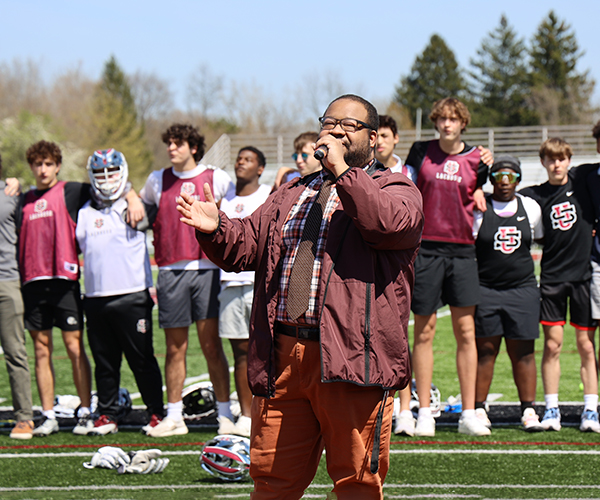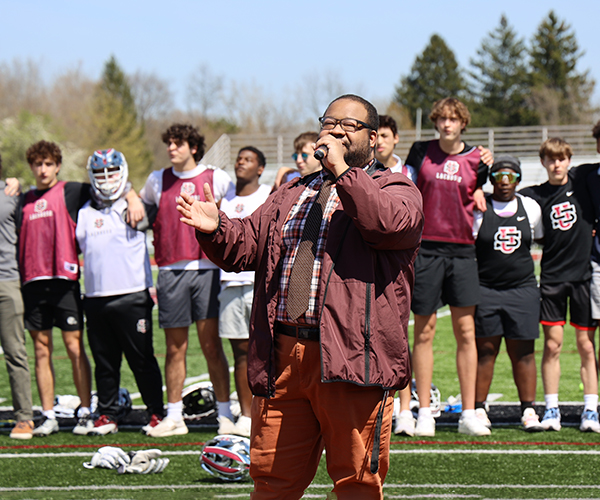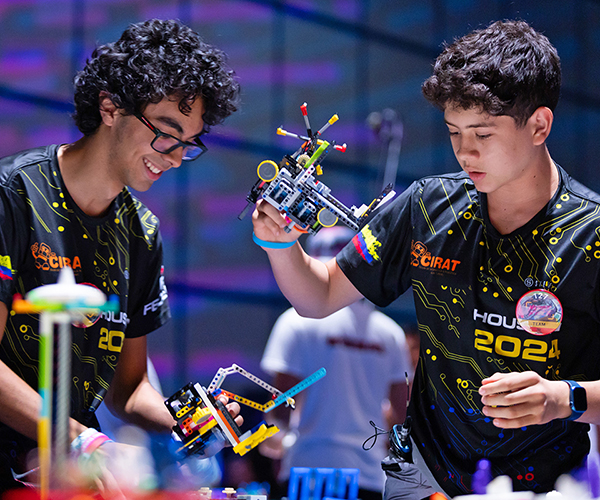Alissa McGough was momentarily stunned when her 2-year-old son, Cormac, ran through his family's Painesville home naked — except, that is, for the silk scarf tied around his neck and the tattoos he had drawn on his arms with markers.
So she turned to Facebook for immediate parenting support: "Hmmm. How to react?" she posted. But as she typed the words, she was laughing at the originality of his costume.
You would think McGough might have seen it all by now. Cormac is her sixth child, with the ages ranging from 2 to 18. She spends her days in what seem like parallel universes: parenting teens and preschoolers simultaneously.
McGough documents her parenting challenges and successes in funny and often sentimental Facebook posts and on her new blog, Life in a Gaggle. A former English teacher and copywriter, she finds writing about the ups and downs of parenting therapeutic and a way to connect with other parents.
"One of my best coping mechanisms is to not take myself too seriously," she says.
And although there's humor in the portrait she paints about her streaking son, McGough also finds some positive lessons in the situation, like how important it is to give children the space to create — even if it's not what you had in mind.
She had washable markers and other art supplies out for her younger children, for example. The scarves were for music and movement that she likes to do with them. But with his imagination, Cormac used the items in different ways to create and act out a character.
"Kids need to be thinking, imagining and playing," says Dr. Lolita McDavid, medical director, child advocacy and protection at University Hospitals Rainbow Babies and Children's Hospital. "Kids need unscheduled time to lie back in the grass and look up at the clouds. They need time to be kids."
Unfortunately, play seems to be getting the squeeze in today's society. Several factors are to blame, according to a 2007 report from the American Academy of Pediatrics, including more children attending structured child care; schools pushing more rigorous academics and cutting free time for play; rising safety concerns; and passive screen time monopolizing children's activities. Yet, play remains critical in the emotional, physical and intellectual development of children.
Deva Walker, the mother of four in University Heights, finds it important to play games, including cards and board games with her children.
"You learn a lot about your kids by how they play a game," Walker says. "You learn their personalities, like who really has to win, who hates to lose and who is more willing to cheat. And you can teach them patience by playing games."
Children also gain something else valuable during these times: their parents' attention, which is critical to raising healthy kids.
"Put your phone down, stop texting while children are seeking your attention," says Dr. Molly Wimbiscus, a child and adolescent psychiatrist at Cleveland Clinic and Westown Family Health Center.
That doesn't mean they can be disruptive, though. "Do remind them to be respectful and wait their turn if there is an emergency you are attending to or if you are in the middle of an important conversation," she adds.
"Children need parents who love them unconditionally," McDavid says. "They don't need four different game systems or Coach bags when they're 12."
So listen to your child, and answer when they ask questions.
"Children are very inquisitive. They have feelings just as we do, and they always want someone to listen to them," says Francine Cooper, a mother of three, grandmother of two and home child care provider. "We learn from the children, as well as they do from us."
McGough says she's learned a lot during her 18 years of being a mom, but listening is one thing she has always valued as critical to good parenting.
"I listen to them, truly getting down on their level, looking them in the eye and listening to what they're saying, and then I respond to it," she says.
But it's the way that she responds that has changed through the years. Rather than just give outright praise for a job well done, she follows up with a question to engage her child in a conversation.
For example, if her son wins a swim meet, she congratulates him but then asks, "What are some of the things that have been helpful in your practicing?" or "What are the things you learned that you're going to carry with you from this into your next meet?"
"What a difference it's making in our relationship," she says. "By helping them to take ownership of their moments, they are choosing to recognize the role they play in shaping their own lives. They learn it is about the journey, not just the arrival at a destination. And by helping them understand that, it strengthens our relationship because I'm learning more about their thoughts and goals."
"Talk to them as much and as meaningfully as you can," says Wimbiscus of the Cleveland Clinic. "Use words that might require explanation. Simply by having engaging conversations with children, we help develop their language, curiosity and vocabulary skills."
When you don't know the answer to a child's question, it's OK to be honest and create an opportunity to learn together.
Phoebe Atkinson, education director at the Nature Center at Shaker Lakes, says even she sometimes doesn't know what something is on a hike in the woods with kids.
"I'll say, "What do you think it is? What does it look like?'" she says.
That questioning engages children on their level, and it also takes the pressure off parents. Such questions are also one reason Atkinson advocates getting out of the subdivision and into the woods. The new environment opens all kinds of paths for discovery, imagination and play.
"It helps the child appreciate that the world is bigger than one's living room," says Dr. John Duby, director of developmental-behavioral pediatrics at Akron Children's Hospital.
From a physical health perspective, there are benefits too: A one-mile hike burns about 30 calories in a 60-pound child. "One of the biggest issues around the need to get outside is the need to be more physically active," says Duby. "We recognize the challenges that we have today with obesity and children."
Along with regular physical activity for kids, Duby encourages monitoring portion size, avoiding sweetened beverages and minimizing computer and TV time.
Those can be tough tasks during winter. So Thea Wilson, director of early childhood education at Cleveland Music School Settlement, suggests parents and children clear some space in the house and just dance together for a few minutes. It can be fun, and it gets everyone moving, strengthens the parent-child bond and helps children develop a physical awareness and listening skills.
Wilson appreciates the power of music, especially classical music, in other ways too. "When a child is over-stimulated, the first thing I do is to turn on music before we have a chat," Wilson says. "You can eliminate adverse behavior with music."
For the tough temper tantrums that parents deal with, Rainbow's McDavid advises that the best thing is to walk away and ignore the tantrum. "A temper tantrum is an attempt to get your attention," she says. "They don't care if that attention is yelling at them. If you respond to a tantrum the kid goes, •Hey, this works.' "
Reinforcing good behavior is the best way to avoid tantrums, says McDavid. When they do something right, call it out.
It also works to practice role modeling, she says. For example, if a child needs to ask a teacher about a grade, practice the interaction with the child.
Deva Walker does her best to adhere to strict bedtimes, chores and rules that homework is done immediately after school. That's because consistency, experts and moms agree, is key to raising a great kid.
For a while Walker sat next to her 7-year-old son so she'd be nearby if he needed homework help, but found he wouldn't even try. Now, she asks him to do a page at a time before checking it over with him.
"He actually does better now when he realizes, 'Oh I can do this myself!' " she says.
Child development experts admit it can be tough for some parents to balance caring about a child and hovering over them.
"Children need space to learn and err naturally," Wimbiscus says. "Care enough to let them, and know they will gain the valuable lesson of managing failure in the future when they are on their own."
Watching your child fail at something can be painful, but it's an important rite of passage for both the child and the parent.
"[Parenting is] hard work, and it's everyday work," McDavid says. "It doesn't go away when they turn 18."
And, there's that key to good parenting that McGough experienced at the moment she saw her son streaking with a homemade cape and tattoos through the house.
"You have to laugh," she says.



